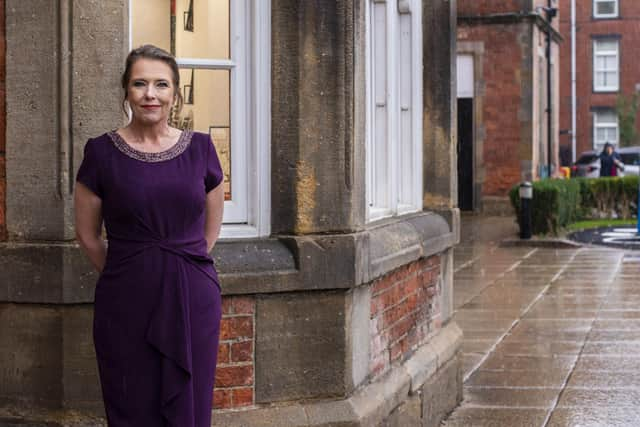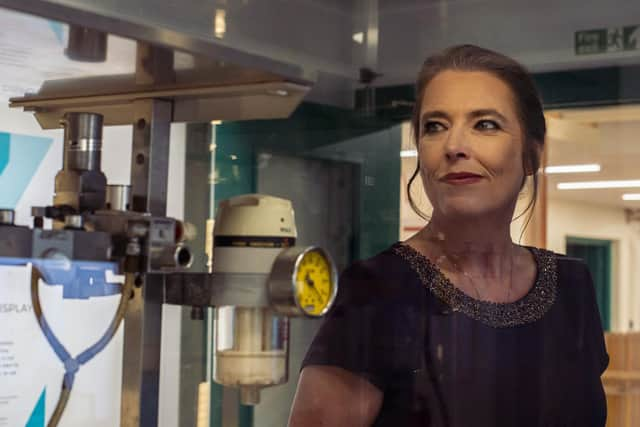Meet the Yorkshire woman overseeing Leeds research centre trialling new treatments for patients
Having spent just two days at the facility, which carries out early stage and experimental clinical trials, she found herself working from home, trying to get to grips with a new role and new team. Her remit already included helping to oversee the work of the CRF. Then, when the first lockdown began, she was made a project lead for Covid-19 research. “It was a very interesting six months taking over,” she says. “We had to look at changing the direction of what we were doing... All non-essential research was paused at that point and staff were redeployed to help with the clinical response to the pandemic.”
As a member of the senior management team of the CRF, Dr Radford’s ‘typical’ day job sees her tasked with operational oversight of the facility, ensuring its portfolio of studies are carried out to high standards that meet UK regulatory and governance requirements. Those studies, some of which test new treatments in patients for the very first time, include trials of novel drugs, medicines, vaccines and therapies, alongside innovative technologies.
Advertisement
Hide AdAdvertisement
Hide AdOver the next half-decade, 52-year-old Dr Radford says the main priority is to increase the number of early phase and experimental medicine trials taking place across a range of diseases at all the CRF’s sites, including a flagship centre at St James’s Hospital. "We aim to be able to offer a wide range of trials for our patients that will improve outcomes and ultimately address unmet needs,” she says. “The patient’s voice is very important to us and we include patients, carers and members of the public in the work we do and to help us maximise the impact that research can make within the communities we support.”


The vision will be helped by £8.7million of funding from the National Institute for Health and Care Research (NIHR), announced a year ago, in February 2022. Leeds Teaching Hospitals NHS Trust, which hosts the CRF in collaboration with the University of Leeds, was awarded the cash to fund the CRF for five years from September just gone as part of a nationwide drive to expand the delivery of early phase clinical research in NHS hospitals across England. Though the CRF also works with industry, research councils and charities to run trials, its core funding comes from the NIHR and Professor Chris Twelves, the CRF’s clinical director, said at the time that last year’s funding allocation represented an eleven-fold increase for the facility “which will be genuinely transformative for experimental medicine research in Leeds”.
Dr Radford, who lives in Pudsey, has seen first-hand the impact that research can have – getting new treatments and tests to patients who need them. “It still makes me smile now if I or a family member is at the GP and started on a drug and I look and think ah yes I did the trials for that when it had its original lab name,” she says. “Without the research, we wouldn’t have these new drugs at all to prescribe to help patients.”
Born in Sheffield, Dr Radford was a qualified first-aider and trainer by the age of 16, having developed the skills as an RAF Air Cadet. A cadet leader suggested she considered a career within nursing and she began her nurse training at Barnsley Hospital in 1988. Her first job was as a nurse covering operating theatres but she wanted a career in oncology so moved to Leeds and took up post as a staff nurse on a busy gynaecology and oncology ward at the city’s General Infirmary. Whilst undertaking further training in oncology, she met a research nurse, shadowed her in clinical practice – and was hooked.
Advertisement
Hide AdAdvertisement
Hide AdHer first research role came in 1996 at Cookridge Hospital and she later worked for periods at St Gemma’s Hospice and Seacroft Hospital and also completed a PhD. After that, she held posts as clinical trial manager at the Leeds Centre for Neurosciences and in operational management overseeing drives to develop new diagnostic tools with academics, researchers and industry partners. Then came her current role from March 2020.


A small proportion of the most essential research work did continue at the CRF during the height of the pandemic. But many staff joined the frontline healthcare response and Dr Radford was asked to help develop a project recruiting a diverse population to take part in Covid-19 vaccine studies in community settings. “If you’d have said to me six months prior that I’d be trying to design a trial delivery on mass scale not set in the NHS, I would have said you’d have been joking,” she reflects, “but this was the reality.”
As the peak of the pandemic tailed off, CRF staff started returning to research. “We had to prioritse which projects we reopened,” Dr Radford says. “We also had studies that had been waiting in the wings to be set up. We had to go back and see if they were still viable and check research priorities hadn’t changed. And we had to think about recruitment, as people were still wary about coming into hospital spaces.”
Now, as well as plans to increase the number of trials the CRF supports and the number of staff delivering experimental medicine research, Dr Radford says the team will also prioritise working to raise the profile of the trials in the hope of increasing the number of people involved. “We did some great work during the pandemic and I am looking forward to building on connecting with our communities through a new virtual outreach programme where we hope to try to demystify research, what it is and what it means to take part and be involved.”
